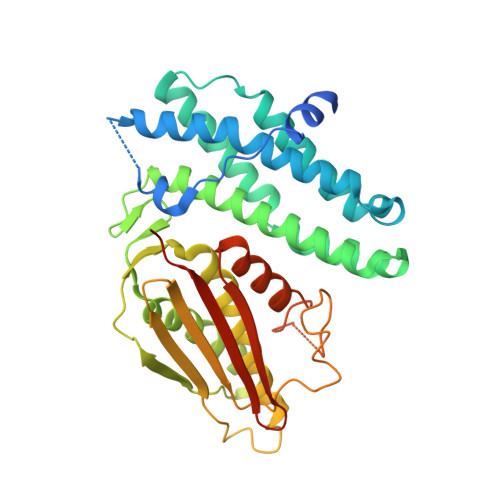Small molecule branched-chain ketoacid dehydrogenase kinase (BDK) inhibitors with opposing effects on BDK protein levels.
Roth Flach, R.J., Bollinger, E., Reyes, A.R., Laforest, B., Kormos, B.L., Liu, S., Reese, M.R., Martinez Alsina, L.A., Buzon, L., Zhang, Y., Bechle, B., Rosado, A., Sahasrabudhe, P.V., Knafels, J., Bhattacharya, S.K., Omoto, K., Stansfield, J.C., Hurley, L.D., Song, L., Luo, L., Breitkopf, S.B., Monetti, M., Cunio, T., Tierney, B., Geoly, F.J., Delmore, J., Siddall, C.P., Xue, L., Yip, K.N., Kalgutkar, A.S., Miller, R.A., Zhang, B.B., Filipski, K.J.(2023) Nat Commun 14: 4812-4812
- PubMed: 37558654
- DOI: https://doi.org/10.1038/s41467-023-40536-y
- Primary Citation of Related Structures:
8F5F, 8F5J, 8F5S - PubMed Abstract:
Branched chain amino acid (BCAA) catabolic impairments have been implicated in several diseases. Branched chain ketoacid dehydrogenase (BCKDH) controls the rate limiting step in BCAA degradation, the activity of which is inhibited by BCKDH kinase (BDK)-mediated phosphorylation. Screening efforts to discover BDK inhibitors led to identification of thiophene PF-07208254, which improved cardiometabolic endpoints in mice. Structure-activity relationship studies led to identification of a thiazole series of BDK inhibitors; however, these inhibitors did not improve metabolism in mice upon chronic administration. While the thiophenes demonstrated sustained branched chain ketoacid (BCKA) lowering and reduced BDK protein levels, the thiazoles increased BCKAs and BDK protein levels. Thiazoles increased BDK proximity to BCKDH-E2, whereas thiophenes reduced BDK proximity to BCKDH-E2, which may promote BDK degradation. Thus, we describe two BDK inhibitor series that possess differing attributes regarding BDK degradation or stabilization and provide a mechanistic understanding of the desirable features of an effective BDK inhibitor.
- Pfizer Worldwide Research, Development & Medical, Cambridge, MA, 02139, USA. rachel.rothflach@pfizer.com.
Organizational Affiliation:




















